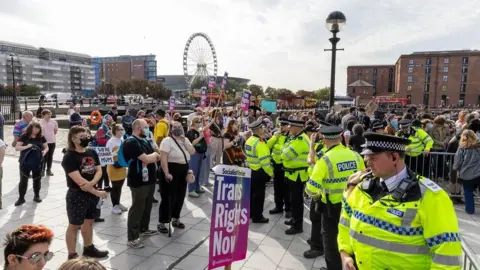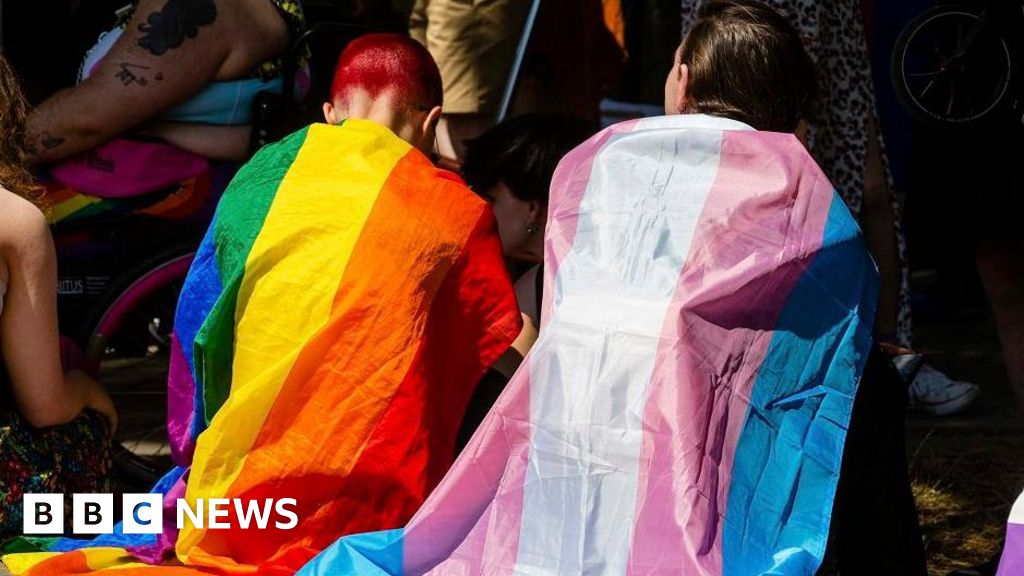Political correspondent
Political reporter
 Getty Images
Getty ImagesWhat is a woman?
In recent years it is a question that has caused political punch-ups, party splits and despatch box spats.
A complex, emotionally-charged and fiercely contested argument around gender, trans rights and women’s sex-based rights has often left politicians at Westminster floundering to answer a seemingly straightforward question.
Today’s Supreme Court ruling may, just may, calm a political row that has produced all sorts of verbal contortions, particularly from Sir Keir Starmer.
Appearing on the BBC’s Question Time election debate in June last year, the Labour leader said he agreed with former Prime Minister Tony Blair’s comment that “biologically, a woman is with a vagina and a man is with a penis”.
But he was criticised by the Harry Potter author and former Labour donor JK Rowling, who accused the party under Sir Keir’s leadership of a “dismissive and often offensive” approach to women’s concerns.
The question of self-identification for transgender people has long been thorny for the Labour Party.
Its 2019 manifesto committed Labour to introducing self-identification.
In September 2021, the then-leader of the opposition slapped down one of his own MPs, Rosie Duffield, for saying that only women have a cervix.
Sir Keir told the BBC’s Andrew Marr Show: “That shouldn’t be said. It’s not right.”
Duffield has since quit the Labour Party and now sits as an independent.
Speaking to LBC in March 2022, Sir Keir was repeatedly pressed on the issue, saying the “vast majority” of women “of course don’t have a penis” – adding that those who are born with a gender they don’t identify with should be treated with respect.
With the issue increasingly divisive in his own party, the Labour leader said to the Sunday Times a year later: “For 99.9% of women, it is completely biological… and, of course, they haven’t got a penis.”
By the summer of 2023, Labour’s position had shifted and the party ruled out introducing a self-ID system to allow people to change their legal sex without a medical diagnosis.
Sir Keir told BBC Radio 5 Live: “Firstly, a woman is an adult female, so let’s clear that one up.”
Often sounding completely exasperated by the question, the Labour leader said in one interview that “almost nobody is talking about trans issues”, querying why it had become a focus of fierce debate.
But it had, whether he liked it or not.
The Conservative Party repeatedly tried to ridicule Sir Keir’s position and carve out a clear political dividing line.
At the Tory conference in 2023, then-Prime Minister Rishi Sunak, said: “A man is a man, a woman is a woman, that’s just common sense.”
But his jibes against the Labour leader were not without controversy.
During Prime Minister’s Questions in February 2024, Sunak jokingly ridiculed Sir Keir for U-turning on how he defined a woman.
But the mother of murdered teenager Brianna Ghey – who was transgender – was in Parliament that day and Sunak faced calls to apologise.
By the time of last year’s general election, Sunak said voters faced a “crystal-clear choice” about the protection of single-sex spaces, promising to rewrite the Equality Act to make clear that sex as a protected characteristic means biological sex.
Today’s Supreme Court ruling has been welcomed by the Conservatives, with leader Kemi Badenoch calling it a “victory for all of the women who faced personal abuse or lost their jobs for stating the obvious”.
As Sunak’s women and equalities minister, Badenoch led the UK government’s efforts to block Scotland’s Gender Recognition Reform Bill.
She has previously criticised what she called “extreme gender ideology” and “trans ideology” and opposed gender-neutral toilets.
And in a sign that the Tories might finally be ready to give up one of their most cherished attack lines, Badenoch declared on social media: “The era of Keir Starmer telling us that some women have penises has come to an end. Hallelujah!”
A Labour source said Sir Keir had brought the party to a “common sense position” on the subject from an “activist” stance, and it was “one of the reasons” the electorate felt that they could back the party after the “disaster of 2019”.
 Getty Images
Getty ImagesLabour are not the only party to have tied themselves in knots on this issue.
It was particularly thorny for the SNP, whose former leader Nicola Sturgeon championed the expansion of trans rights, cheered on by some in her party and opposed loudly by others.
Scotland’s First Minister John Swinney, who has been keen to avoid the issue, will now face the challenge of ensuring his government adheres to the law as interpreted by the Supreme Court.
The Liberal Democrats have had their problems too.
Officially, the party is pro-trans rights. It has a powerful and influential LGBTQ+ section and campaigned at the last general election for legal recognition of non-binary identities.
In May 2023, leader Sir Ed Davey told LBC: “The vast majority of people will have the same gender as their biological sex, but a small number won’t.”
When asked by presenter Nick Ferrari “so, a woman can have a penis?”, he replied: “Well, quite clearly.”
He went on to suggest that trans people’s rights were adequately protected by the Equality Act, which “allow there to be single sex spaces”.
His comments were ridiculed by then Tory leader Sunak – and did not go down well with gender critical campaigners in his own party.
Liberal Voice for Women (LVW), which has fought a long campaign against a ban on having a stall at the annual Lib Dem conference, said their leader had made the party “look dishonest, unreliable and detached from reality”.
Earlier this year, party chiefs backed down and allowed LVW to hold events and have exhibition stands after the group threatened to sue for discrimination.
 Getty Images
Getty ImagesReform UK is clear in its opposition to what it calls “transgender indoctrination” and is committed to scrapping the Equality Act.
Its 2024 general election “contract” states: “There are two sexes and two genders.”
The party adds: “It is a dangerous safeguarding issue to confuse children by suggesting otherwise… no gender questioning, social transitioning or pronoun swapping, inform parents of under-16s about their children’s life decisions. Schools must have single-sex facilities.”
On paper, the Green Party of England and Wales is equally clear, at the opposite end of the spectrum.
The party’s charter of Rights and Responsibilities states “trans men are men, trans women are women, and that non-binary identities exist and are valid”, and it campaigns to make it easier for trans people to change their legal status.
But within the party there are major splits over the issue.
Last year, the Greens were ordered by a court to pay nearly £100,000 to their former deputy leader Shahrar Ali after it found the party had discriminated against him when they fired him as a spokesman during a row over his gender critical beliefs.
Today’s court ruling takes the immediate pressure off the Labour government and other politicians who have struggled to answer the question “what is a woman?”
But with passions running high on both sides of the debate, it is unlikely to go away.
Additional reporting by Sam Francis and James Cook

















Leave a Reply